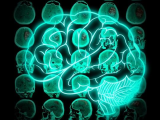Nov 2, 2004 (CIDRAP News) The National Institute of Allergy and Infectious Diseases (NIAID) has awarded contracts worth more than $73 million to study the mechanisms by which certain infectious agents, including potential bioterror agents, trigger immune reactions, the National Institutes of Health (NIH) announced yesterday.
Fourteen contracts have been approved for the Large-Scale Antibody and T Cell Epitope Discovery Program, according to the NIH, which includes the NIAID. Epitopes are the regions of infectious agents that elicit immune responses. Studying them may uncover new targets for vaccines, therapies, and diagnostic tools against potential bioterror agents, the NIAID announcement said. Such research also could reveal targets among emerging and re-emerging infectious diseases such as influenza and West Nile virus.
The information on newly identified epitopes will be freely available to scientists on a searchable database that is being developed, the NIH said.
This research about a wide variety of microbes will greatly expand the small-scale work that has been done for years, said Daniel Rotrosen, MD, director of NIAID's Division of Allergy, Immunology, and Transplantation.
NIAID Director Anthony S. Fauci, MD, said, "The information generated by this program will deepen our understanding of how components of the immune system defend against certain infectious agents, enabling researchers to design new and improved medical countermeasures."
The NIH statement explained that epitopes are recognized by the body's B and T cells, which are white blood cells that detect pathogens. Each can bind only to a particular foreign molecular structure, or antigen. The specificity is determined by the receptors on the surface of each cell, the NIH said.
The B- and T-cell specificity, as well as the diverse functions of these cells, determines the effectiveness of immune responses, the NIH said. B cells make antibodies, which bind to target antigens at their epitopes, eliminating the pathogen before infection can spread or marking it to be destroyed by other cells. T cells promote powerful antibody responses, destroy infected target cells, or control inflammation.
Nearly all the contracts involve evaluating newly discovered epitopes in preclinical or clinical studies, where possible, for their capacity to prompt immune responses.
Institutions involved in the Large-Scale Antibody and T Cell Epitope Discovery Program are the Scripps Research Institute in La Jolla, Calif.; Benaroya Research Institute at Virginia Mason Medical Center in Seattle; La Jolla Institute for Allergy and Immunology in San Diego; University of Oklahoma Health Sciences Center in Oklahoma City; Duke University in Durham, N.C.; Imperial College in London; Johns Hopkins University in Baltimore; University of North Carolina, Chapel Hill; Vanderbilt University in Nashville; Torrey Pines Institute for Molecular Studies in San Diego; Oregon Health and Science University in Portland; University of Copenhagen in Denmark; and the Centre for Biological Sequence Analysis at the Technical University of Denmark.
See also:
Nov 1 NIH announcement
http://www.nih.gov/news/pr/nov2004/niaid-01.htm



















